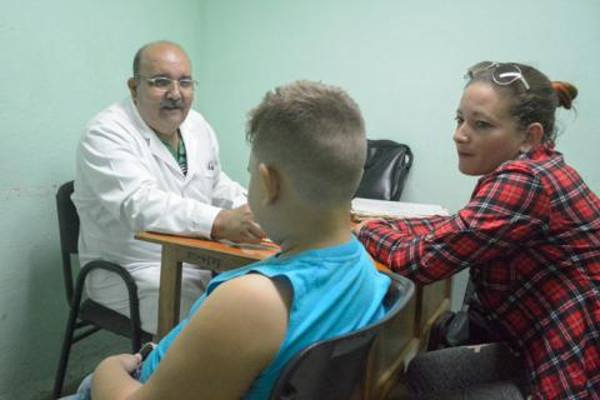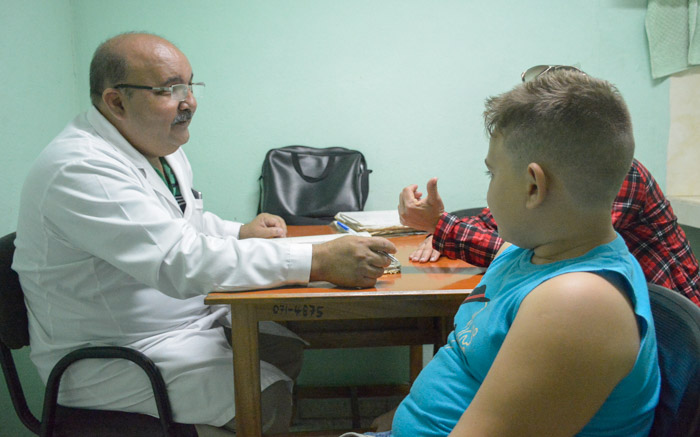CAMAGÜEY.- When we hear about diseases of the central nervous system, we usually think of the brain or psychiatric ailments; however, these include muscles, peripheral nerves, conditions of the spinal cord, and sense organs: hearing, sight, smell, taste, and touch.
Depending on the condition that occurs in this way, part of the nervous system will be affected, and in correspondence with the result of the medical investigations, the behavior to be followed will be indicated by the specialist. All these insights were made known by Dr. Carlos M. Busquet García, Master in Medical Emergency, specialist in Clinical Neurophysiology and director of the Eduardo Agramonte Piña pediatric hospital.
—What are the specialties included in Neurosciences?
—There are several, even non-medical ones. In the case of clinics we have those destined to attend to those of the nervous system, such as Neurology, purely clinical and Neurosurgery or Neurosurgical, with surgical intervention as one of their essential therapeutic behaviors; Neuropsychology, a field in which Camagüey is developing at a good pace and is directed more towards diagnosis and rehabilitation; Psychiatry, better known by the population and dedicated to conditions related to the interrelation between human beings; and perhaps the least known for being the newest, Neurophysiology, on one hand, the basic one that is dedicated to scientific research and on the other, the clinic directed to the study of the functioning of the nervous system and the diseases that affect it.
"In Cuba the latter is one of the newest, since its institutional development began in 1969, attached to the National Center for Scientific Research and attached to it the Center for Neuroscience, with the intention of carrying out this specialty in the country, in a coupled way equipment and scientific research related to the functioning of the nervous system. The conceived laboratory has biologists, electronic, computer, statistical, chemical, biochemical engineers, among others”.

—All this happens despite the economic problems the country is going through...
—That's right, and a Cuban company that produces equipment in favor of Neurophysiology opens. The first is that of electroencephalography, well known to the population, previously drawn on paper and now digital. Cuba is among the first five countries in the world in the technological development of this specialty because they are produced here, with high prestige in Latin American countries. It is appropriate to say that Camagüey has such equipment.
“In 1990, in an agreement between Neuroscience and the Ministry of Public Health (MINSAP) the National Laboratory Network was developed for this purpose, of course, with the inclusion of the training of specialists, for which Cuba has its Network of Clinical Neurophysiology.
“In that decade, a program started by the Historical Leader of the Revolution, Fidel Castro, which consists of a diagnostic project, such as hearing impairment at an early age, from birth, with the investigation throughout the country. Our hospital is among those that started it, at that time it was for all children perceived as at risk, while today it is universal.
“To guarantee compliance with the program, we have digitized equipment, today in the fifth generation, with a design that competes in the international market, and includes Neurotics, the name of the brand aimed at studying the central peripheral nervous system, and the Audix, for hearing screening, just to mention a few ”.
—Who makes up that Laboratory?"
—A multidisciplinary team with several departments. It allows addressing the nervous system under study at almost all levels; explore the spinal cord at certain levels, how the auditory pathway behaves. Brainstem auditory evoked potentials (PEATC) and visual evoked potentials (PEV), somatic-sensory evoked potentials (PESS) are performed in order to know the sensory pathway.
“There are other conditions that are not as visible as those of the autonomic nervous system, hence its greater complexity. They have to do with the vagal system, related to heart rate, blood pressure, dilation or contraction of blood vessels, piloerection (the prickling of the skin) and other symptoms. In the capital, complete studies are carried out on these and here in our hospital some are carried out.
"Likewise, the higher cortical functions are studied here, which are the cognitive evoked potentials (PEC) most related to Neuropsychology focused on the higher mental functions (memory, language, executive functions) and in behavioral brain functioning and this is not currently available in Camagüey.
“In any case, we are inserted in the National Network and research is being carried out at that level. One of the main projects that we have and that is being handled in Cuba is the hearing screening that I already mentioned, which comprises the cochlear implant —transducer that transforms acoustic signals into electrical signals that stimulate the auditory nerve— in children with hearing loss. They are detected here, in this case, they are operated in Havana and the rehabilitation is in the province ”.
—Only in the “Eduardo Agramonte Piña” is there equipment for this specialty?
—As dementia and Alzheimer's are also investigated, we have an electroencephalography laboratory at the René Vallejo psychiatric hospital and a Clinical Neurophysiology laboratory at the Manuel Ascunce Domenech University Hospital and, like the one at the Pediatric Hospital, we have offered services to the provinces of Las Tunas and Ciego de Ávila for years.
—When does a person know that he should go to this type of consultation?
—They are always referred by a study proposal made by their family doctor, who can be specialists in Neurology, Otorhinolaryngology, Neurosurgery, Ophthalmology and others, after the suspicions of diagnoses; hence, it is a research laboratory for diagnostic means that also enables therapeutic conduct and prognosis according to the damage discovered in the patient.
“Schizophrenias, epilepsy, neuromuscular studies such as muscular dystrophies in the newborn and neuropathies are important projects.
"And as Neurophysiology continues its development in the world, it has an important interrelation with Imaging, everything that allows studying images over time, closely linked to scientific research."
Translated by Linet Acuña Quilez



